In this article:
The dropping temperatures and low humidity during winter often affect the skin barrier. As a result, the skin fails to retain its water content, making it skin flaky and dry.
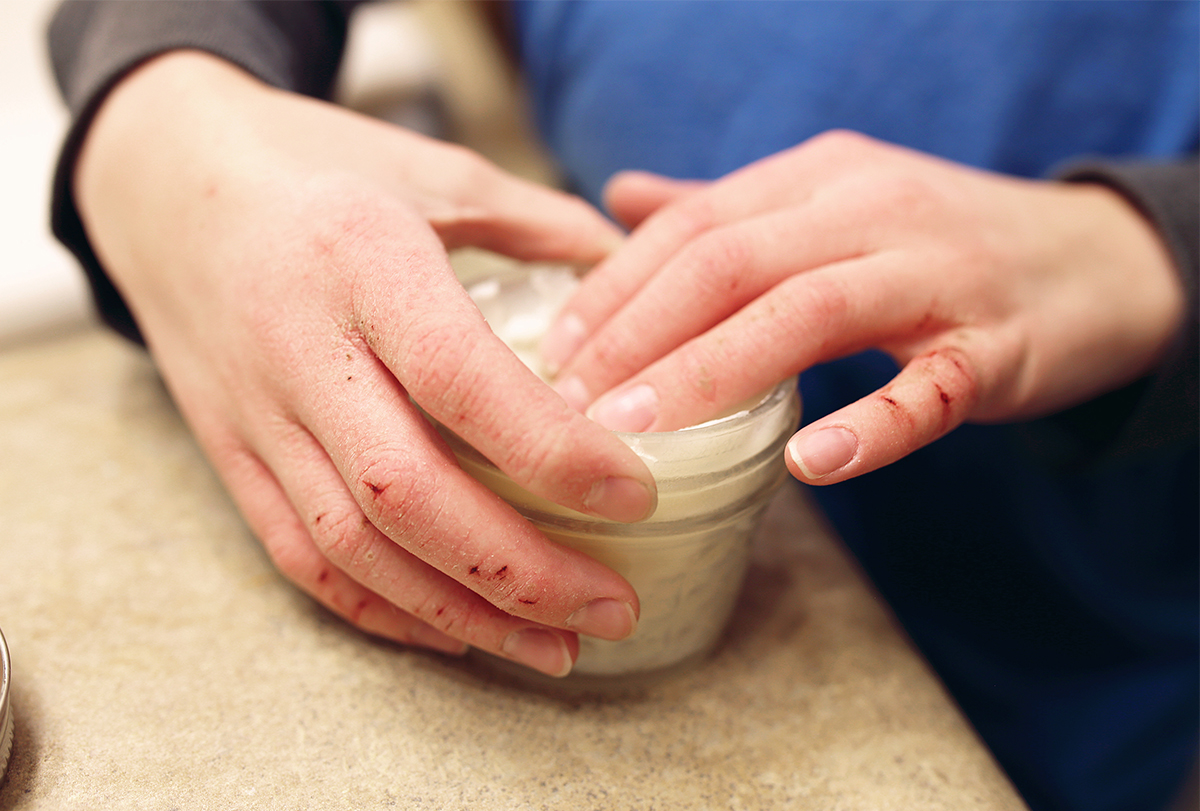
Nevertheless, such skin dryness can be easily managed with self-care measures and home remedies. This article discusses some at-home treatments for skin dryness and preventive measures to avoid it in the first place.
Home Remedies for Dry Skin in Winter
The following easily available ingredients will help you to take care of dry skin in winter.
Note: Wash the affected areas with lukewarm water and pat the skin dry before using any of the below remedies for higher efficacy.
1. Use plant oils
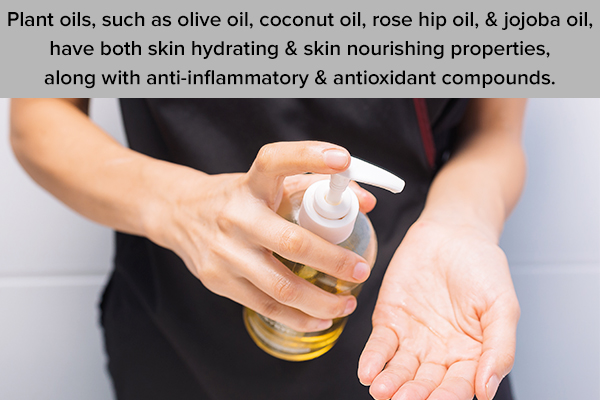
Plant oils, such as olive oil, (1) coconut oil, (2) rosehip oil, and jojoba oil, have both skin-hydrating and skin-nourishing properties, along with anti-inflammatory and antioxidant compounds.
Therefore, these oils can help manage skin dryness, its associated skin infections, and UV damage. (3)
How to use:
Gently massage these oils onto the skin. Reapply whenever necessary. (3)
2. Moisturize with natural fats
Natural fats include shea butter, (4) mango butter, (5) cocoa butter, (6) avocado butter, and milk cream. These natural fats contain oleic and linoleic acids that are easily absorbed into the skin and help moisturize it.
How to use:
Apply avocado butter, milk cream, or shea butter to the skin directly. Other natural fats can be used in the form of lotions available on the market.
3. Try jellies and waxes
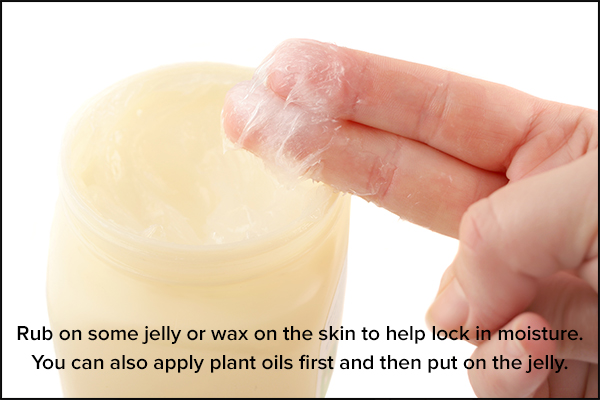
Petrolatum jellies, such as Vaseline and Aquaphor, help retain skin moisture and also exhibit antimicrobial activity. (7) You can also try beeswax or beeswax-based ointments to help treat skin dryness. Beeswax contains sterols and vitamin A that help in skin regeneration. (8)
How to use:
Rub some jelly or wax on the skin to help block moisture. You can also apply plant oils first and then put on the jelly.
4. Apply glycerin
Glycerin helps lock in moisture and supports the repair of the skin barrier.
How to use:
- Apply glycerin, followed by petroleum jelly, to the affected area. (9)
- Mix rose water, lemon juice, and glycerin, and apply the mixture to dry skin at bedtime.
5. Use honey
Honey has humectant, antiseptic, antioxidant, and antimicrobial properties that can help in the treatment and prevention of dry skin. (10) It also helps exfoliate the skin mildly, thus helping get rid of skin flakiness.
How to use:
- Apply raw, organic, or medical-grade honey to your skin.
- Mix rose water, plant oils or natural fats, and honey, and apply the mixture to the affected area. Rinse it off after 20 minutes.
6. Scrub with oatmeal
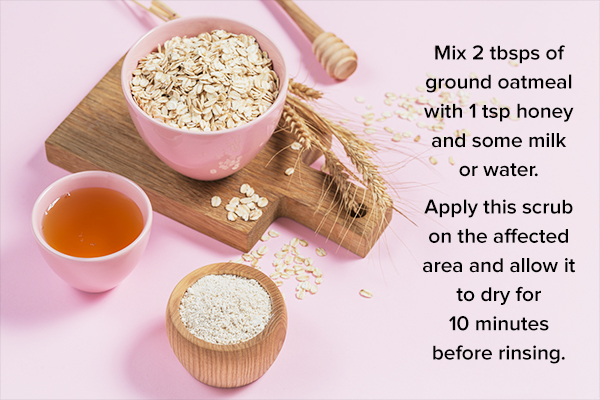
Oatmeal contains various compounds, including lipids, polysaccharides, proteins, minerals, vitamins, and flavonoids, that exhibit antioxidant, cleansing, anti-inflammatory, and moisturizing properties.
Various oatmeal-based products are available on the market that can help manage pruritus and dry skin by cleaning and hydrating the skin. (11)
How to use:
- Mix 2 tbsp of ground oatmeal with 1 tsp honey and some milk or water. Rub this paste on the affected area and allow it to dry for 10 minutes before rinsing.
- Prepare an oatmeal bath and soak in it for around 20 minutes.
7. Apply aloe vera gel
The mucopolysaccharides found in aloe vera gel act as a humectant. Aloe vera also helps stimulate the production of collagen and elastin, which help soften the skin by making it more elastic. (12)
How to use:
- Extract some fresh aloe vera gel and massage it into the dry skin. Rinse it after 15 minutes of application.
- Mix in natural fats or honey to the aloe vera gel before using.
8. Use OTC creams
OTC creams can help in deep moisturization. These may contain: (13)
- Hydrocortisone (especially for the treatment of eczema patches)
- Dimethicone
- Jojoba oil
- Lanolin
- Glycerine
- Niacinamide
- Ceramide
- Eucalyptus extracts
Note: Select hypoallergenic creams since OTC products often contain potential allergens. Moreover, always apply a moisturizer after the use of hydrocortisone creams.
Self-Care Tips to Take Care of Your Skin in Winter
The following self-care tips can help manage and prevent skin dryness in the winter season:
1. Moisturize your skin
Use moisturizing lotions, creams, or ointments at least twice a day. Select moisturizers containing jojoba oil, vitamin E oil, hyaluronic acid, ceramide, salicylic acid, or corn husk. It is best to apply a moisturizer to slightly wet skin after taking a shower.
2. Use vitamin E oil and capsules
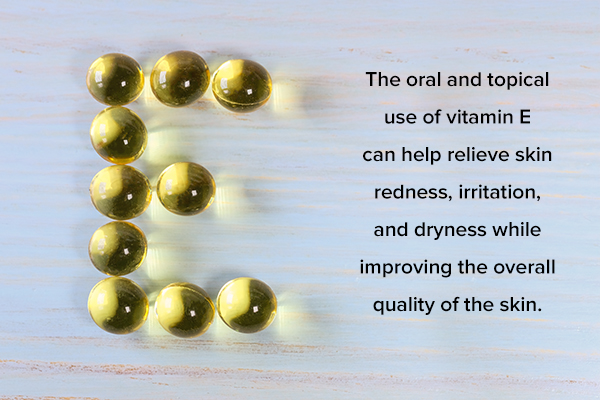
Vitamin E is a fat-soluble nutrient with significant antioxidant properties that help prevent and repair cell damage. It also helps retain skin moisture. Thus, the oral and topical use of vitamin E can help relieve skin redness, irritation, and dryness while improving the overall quality of the skin.
3. Avoid irritant products
Skin care products that contain retinoids, alcohol, or fragrances can irritate the skin. Look for hypoallergenic products. Moreover, toothpaste containing lauryl sulfate should be avoided. This chemical can cause allergic cheilitis and dry out the skin around your lips.
4. Stay hydrated
Drink at least eight 8-ounce glasses of liquids every day to keep your body hydrated. Moreover, avoid alcohol and caffeine as they can dehydrate the skin.
5. Consume a well-balanced diet
Dry skin can also occur due to nutritional deficiencies such as vitamin D deficiency. (14) Eggs and dairy are good sources of vitamin D. Moreover, include omega 3-rich foods, such as freshwater fish, diet nuts, chia seeds, soybean oil, canola oil, and flaxseeds, in your diet to help manage dry skin. (15)
6. Wear gloves
The hands are more prone to dry skin due to constant exposure to the cold weather. To prevent this, wear gloves while stepping outdoors or before doing activities that expose the hands to chemicals or greases.
7. Wear soft clothes
Avoid the use of harsh fibers that can irritate the skin.
8. Do not take long hot showers
Take only short 10-minute baths or showers, once daily.
9. Avoid harsh scrubs
Rubbing your skin with scrub brushes, bath sponges, or washcloths can increase the risk of skin tearing. Similarly, avoid rubbing your skin while drying it after a shower. Instead, pat or blot it dry.
10. Use mild cleansers
Soaps, including antibacterial soaps, can be harsh on your skin and can remove its natural oil content, making it dry.
On top of that, they can disturb the natural pH of the skin, which is slightly acidic to make it more alkaline. Alkaline skin is more conducive to the growth of bacteria and therefore more prone to skin infections such as acne.
A good-quality cleanser should deep clean the skin without stripping its inherent moisture or altering its pH balance.
11. Use humidifiers

An indoor humidifier can help increase moisture in the air, thus keeping your skin from drying out. Make sure to clean the humidifier regularly to prevent mold buildup.
12. Refrain from scratching
Do not rub or scratch the skin as it can increase the risk of infection.
13. Apply sunscreen
Always use a sunscreen of SPF 30 or higher before stepping outdoors. Regular use of sunscreen is necessary as damaging UV rays are present even if the sun rays are mild. Moreover, wear full-sleeved clothes and use protective gear such as sunglasses and hats.
14. Moisturize your lips
Take proper care of chapped lips and avoid licking or wetting them, as it aggravates the dryness. Instead, apply lip balms, petrolatum jelly, or natural fats to hydrate your lips.
15. Exfoliate weekly
Use mild exfoliators at least once a week to remove dry, dead skin cells from the body, and apply a moisturizer after. You can prepare a sugar scrub at home by mixing oats, sugar, and honey or yogurt.
16. Quit tobacco use
Smoking cessation and avoiding tobacco are essential to prevent skin dryness.
Final Word
Dry skin is a common, mild condition, especially in the cold, harsh, winter season. This can be aggravated by long showers, not using moisturizers, exposure to irritants, and insufficient water intake.
Simple self-care measures, along with a few home remedies, can easily help manage skin dryness. Follow the tips mentioned in this article to manage or prevent dry skin in its early stages, as severely dry skin can lead to fissures, cracking, and infections that require medical attention.

- Was this article helpful?
- YES, THANKS!NOT REALLY


